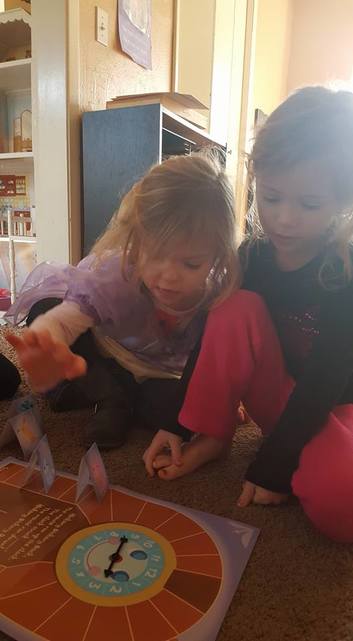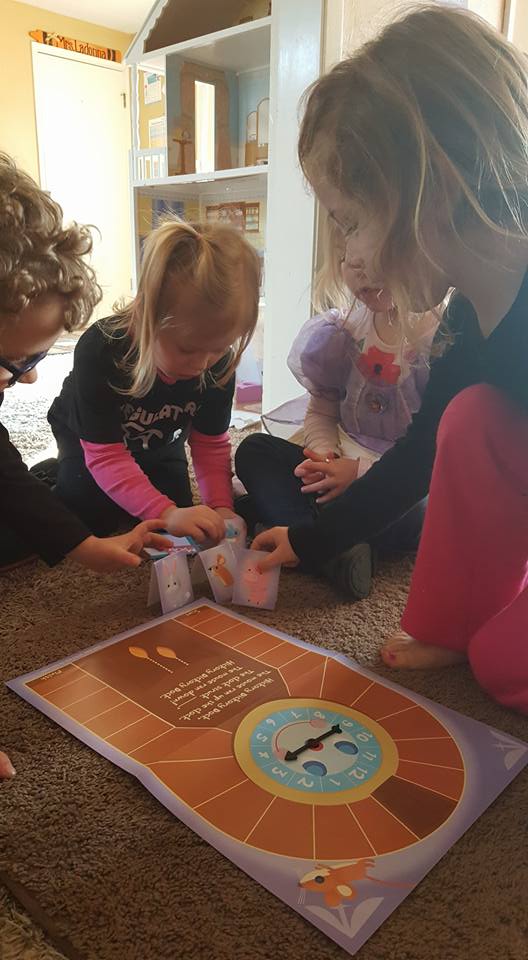Nursery Rhymes and that magic box... Each day during our morning rituals the preschooler's ask, "Let's do something fun today!" I say, "What would you like to do?" They run to that magic box and start digging. Packages and papers flying, experiments, loose parts, yarns, ribbons, paint brushes and books scatter until they land on it, "THIS!" "We want to do THIS!" There are squeals and hustle as we open packages and assemble the plans. We observe. We discuss. We hypothesize. "So what will we need to do this?" I ask. They think and plan... "We will need....." and the planning and gathering turns into a process. The process turns into progress and before we know it we have a full day of play ahead. I love their excitement. I love that they know I will help them accomplish anything they can imagine. I love it when holidays roll around and they are beaming to make hearts or clovers or Christmas trees. There's nothing better than the twinkle of tiny eyes and paint covered hands. For now, we are studying Nursery Rhymes. We live in the world of "Bah, Bah Black Sheep" and "Twinkle, Twinkle Little Star" so turning this into a thematic unit filled with science, math, creative arts and, of course, literacy is child's play! (pun intended!!) Hickory, Dickory Dock!Most of my little one's know many of the nursery rhymes we are covering. Today was Hickory, Dickory Dock! This clock game is one of my favorite new math games from Mother Goose Time!
We first looked at the clock and discussed how the numbers go all the way around the "face" of the clock and the the number 12 is at the very top. This brought about questions... "Why isn't the number 1 at the top? "Where is the zero?" Good questions..... After explaining that clock numbers go in a circle we practiced walking around numbers we placed on the floor. Like little mice we scampered around and around. We then allowed the 2's to continue this active, gross motor play while the older 3's and 4's played the game. In this game they had to practice their social/emotional skills of turn taking, waiting patiently, and politely saying, "Your turn _______" if their friend becomes distracted and forget whose turn it was. These skills are, in my opinion, even more important than the number recognition and counting practice they are receiving by playing this game. In fact the ability to self regulate is a better indicator of academic success than any other indicator (even better than scoring high standard test-based entrance exams!!) This is just another reason why I LOVE games that teach. They can be "teaching" letters, counting, sequencing, that cows pass gas for heaven's sake, I don't care! What they are actually teaching a child in regards to his or her social/emotional development FAR outweighs being able to recognize a lower case "r" or that 13 come after 12. They are teaching patience, persistence, perseverance, taking turns, and that sometimes we win and sometimes we do not, but that we all get to play together. But don't take my word for it. Read the research... “There is a lot of evidence to suggest that self-regulation can be taught in children.” As an example she points to an intervention aimed at improving self-regulation in preschoolers. “In one recent study,” she says, “we found that a series of classroom games in preschool designed to help children practice paying attention, remembering instructions, and demonstrating self-control significantly improved self-regulation skills, especially for children with low self-regulation.” https://www.education.com/magazine/article/self-regulation-children/(Read the full article here.) This article in ChalkBeat discusses the psychology behind self-regulation and the vital importance and superiority it holds over Kindergarten entrance math or reading levels. "In psychology, this lack of self-regulation is referred to as “executive function.” Research shows that executive function is a better indicator of academic success than IQ or entry-level reading or math skills. Anecdotal evidence suggests that a quarter of all children don’t have the skills they need to learn. Forty-six percent of kindergarten teachers reported in one study that more half of their children did not have sufficient levels of self-regulation. Another study of Head Start classrooms found problems with self-regulation, such as kicking or threatening others, occurred once a day for 40 percent of students. There is, however, a silver lining: executive function capabilities can be altered quickly if caught and changed early enough. The problem is, parents are regulating their children instead of teaching their children how to get control of themselves. Key findings in the book:
The skill of self-regulation is a teachable, not an inherent skill and allowing children the time to experience conflict, decision making, and turn taking with the use of games that have predictable as well as non-predictable outcomes is vital to their academic success which translates well into their adult years. So for you and all the little ones in our lives, I wish you well and I hope you play today!! -L
0 Comments
Leave a Reply. |
Life is made of moments..."There isn't anything more full of hope, joy and peace than a child's smile... It captures the mundane and makes it extraordinary." - LaDonna Woolsey I am a Mother Goose Time Blogger. I decided to become one after trying their products because I they are comprehensive and serve my mixed age group well. I do receive products to review from Mother Goose Time and do so with my own honest and thorough opinions. For more information, please contact me at [email protected]
Categories
All
Archives
November 2019
Categories
All
|
Location |
|


 RSS Feed
RSS Feed
